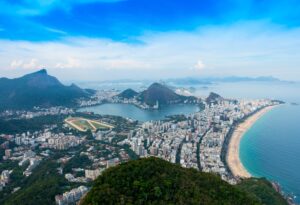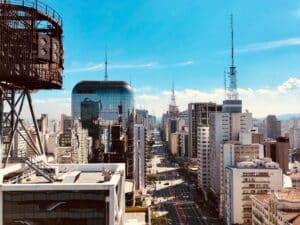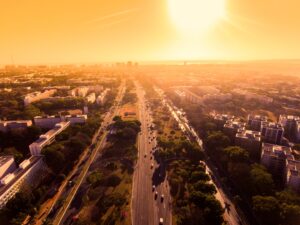An iconic South American country evoking tropical landscapes and the vibrant colors of a famous carnival, Brazil stands out for its cultural richness and the joyful spirit of its inhabitants. The country holds the promise of an expatriate experience filled with discovery and adventure.
If you’re considering making the move, Foyer Global Health is here to assist you in preparing for your new expatriate life in Brazil.
The Procedures for Settling in Brazil
Obtenir un visa
An expatriate in Brazil must obtain a permanent visa to live long-term in the country. There are several types of visas based on the purpose of your stay in Brazil. The work visa, known as autorizações de trabalho, is the most well-known, as it is intended for individuals who have a job contract with a Brazilian company.
It is further categorized into various designations:
The VITEM V visa is the standard temporary visa for any expatriate obtaining employment in Brazil. The application must be submitted to the Ministry of Labor and Employment, which issues the work visa through the Brazilian consulate once approval is granted.
The permanent work visa is aimed at specific categories of qualified foreign workers, such as engineers, scientists, or researchers. Eligible individuals who have held the VITEM V visa for 2 years can, under certain conditions, obtain the highly sought-after permanent visa (visto permanente). For those applying for a permanent visa, it is advisable to consult the federal police, who provide all the necessary procedures to follow.
The National Migration Registry (CRNM)
Within 30 days of your arrival in Brazil, it is necessary to register with the National Migration Registry, still with the federal police. This registration is a mandatory step in your expatriation to Brazil, and it will grant you access to certain procedures, such as opening a bank account. Visit the Federal Police website to complete your registration.
Opening a bank account
The procedures for opening a bank account in Brazil are fairly straightforward. Choose the bank that best suits your needs (the most well-known ones are Banco do Brasil, Itaú Unibanco, or Banco Bradesco), and bring your valid visa, identification document, and the required documents to start the process.

Finding a job in Brazil
Securing a first job in this vast country can prove to be a challenging task, as, similar to some other countries like Hungary, the Brazilian system tends to prioritize local workersv for language reasons. Therefore, be persistent and start your job search from your country of residence, where you might have a better chance of catching a recruiter’s attention. In terms of communication, certain sectors commonly use English, Spanish, or French, but knowledge of Portuguese will be appreciated and sometimes even necessary to be selected for a position. There are numerous job platforms where you can explore new opportunities, such as LinkedIn, InfoJobs.com, or Indeed Brazil.
Lastly, once you’ve landed your dream job, remember that you’ll then be subject to the Brazilian social security system managed by the INSS (National Institute of Social Security). Transitioning into this system generally involves obtaining your tax identification number through the Cadastro de Pessoa Física (CPF) and your worker registration number (NIT), which are prerequisites for accessing various benefits.
Housing
Best cities to live in Brazil
When it comes to deciding where to move in Brazil, there’s only one rule: follow your heart! The country is so vast that it offers numerous destinations for expatriates looking to settle down. Brazilians will quickly make you feel at home with their unmatched hospitality. Here’s a list of standout cities worth considering in your choice:
Rio de Janeiro : A symbol of festivity, Rio de Janeiro is the second-largest city in the country. It attracts expatriates and students due to its economic dynamism. Preferred neighborhoods for foreigners include Leblon and Ipanema, but there are more affordable alternatives like Flamengo or Gamboa.


São Paulo : Residents of Brazil’s largest city live at a frantic pace, where employment opportunities are abundant. It’s a true melting pot of cultures, cuisines, and lifestyles. The cost of living is also higher here, so plan for a larger budget if you wish to live downtown.
Florianopolis : The island it resides on is considered a gem for expatriates who call it home. They appreciate the quality of life and the safety it offers, not to mention the idyllic beaches lining its shores.


Brasilia : The federal capital of Brazil welcomes many affluent expatriates in a highly urban atmosphere. Prices in residential neighborhoods can indeed rise significantly. The city’s governmental nature is strongly evident through the presence of numerous administrative buildings.
Housing Prices
Housing prices can vary greatly between rural regions and major cities. It’s challenging to provide an exact price range. For renting in the centers of major cities, you can anticipate a monthly rent between 1500 and 2500 R$ for a one-bedroom apartment, or between 2000 and 5000 R$ for a three-bedroom apartment. A typical lease duration is 30 months, but exceptions can go up to 3 years. Your CPF number will be required for lease signing.
Favorable climate all year round
As seemingly trivial as it may sound, climate is an important factor for individuals considering moving abroad. Due to its vastness, the Brazilian territory features various climates, including tropical, semi-arid, and mountainous. Overall, temperatures remain quite pleasant, rarely dropping below 10 degrees Celsius in winter. During the summer months (December to February), you can expect warm temperatures, averaging around 32 degrees Celsius in Rio de Janeiro and 28 degrees Celsius in São Paulo.

Transportation in Brazil
For daily commuting in major Brazilian cities, the subway remains the most convenient and quickest mode of transportation. In the rest of the country and smaller towns, buses are highly favored by residents; the network is extensive and well-maintained. Buses are more commonly used than the rail network, which remains less developed.
The brazilian healthcare system
Brazil has a public healthcare system called Sistema Único de Saúde, which faces numerous challenges today. While it aims to provide universal access to healthcare, waiting lists for certain treatments can often be long, medical facilities can become quickly overwhelmed, and private healthcare services might sometimes be unaffordable. As an expatriate, it is strongly recommended to have international health insurance in Brazil. This will provide you the advantage of being covered in case of emergencies at any time, and you’ll be supported by multilingual teams. Finding English-speaking professionals isn’t always easy in Brazil. Additionally, this type of insurance will cover you both in Brazil and around the world, offering extra security during your travels or visits to your home country.
Education
Most expatriates enroll their children in private or international schools, mainly located in Rio de Janeiro or São Paulo. The educational programs are aligned with British or American systems. Many expat parents prefer this option for their children to ease their integration and provide them with a familiar educational environment. There are also bilingual schools offering curricula in both Portuguese and English, with a primary focus on Brazilian content. Children who are already familiar with their surroundings in Brazil will likely integrate more easily into this type of school.
